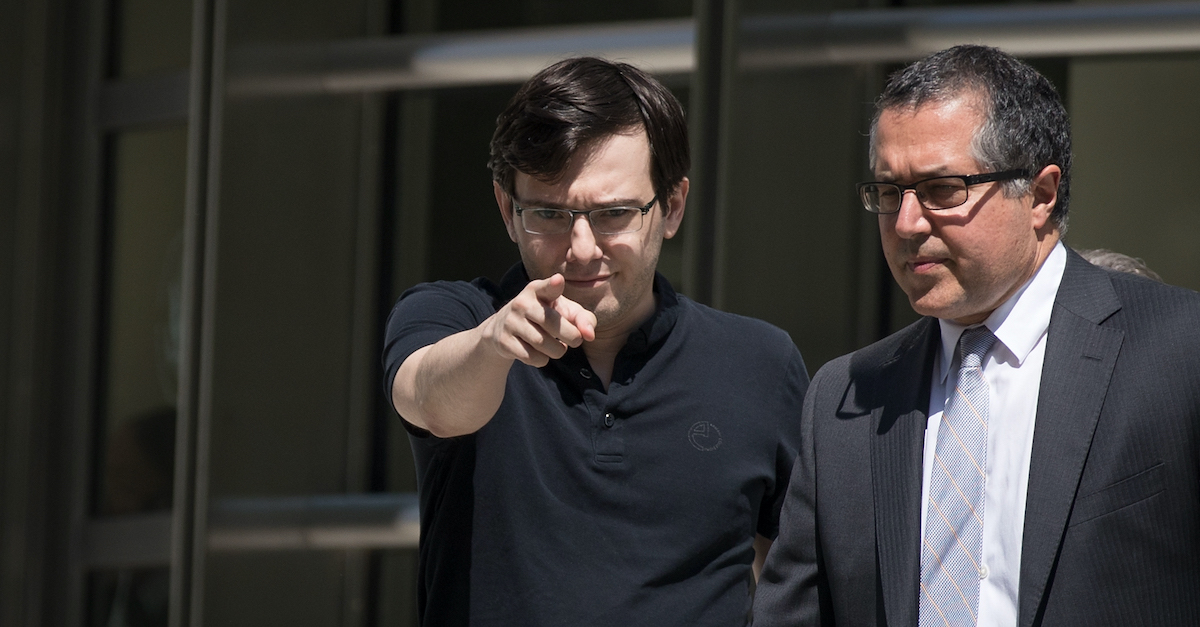
Former pharmaceutical executive Martin Shkreli points as he exits the courthouse after the jury issued a verdict in his case at the U.S. District Court for the Eastern District of New York, Aug. 4, 2017 in the Brooklyn borough of New York City.
The Federal Trade Commission accused disgraced pharmaceutical executive Martin Shkreli on Tuesday of having destroyed evidence relevant to a lawsuit that could lead to his lifetime ban from the industry. Regulators claim that the convicted fraudster invoked his Fifth Amendment right against self-incrimination when asked about a phone he used to conduct business from prison.
Currently incarcerated in a Pennsylvania federal prison following his securities fraud convictions some four years ago, Shkreli now faces civil litigation from state and U.S. regulators about his decision to jack up the price of the live-saving drug Daraprim 40-fold, an act that earned him national scorn and the nickname “Pharma Bro.”
Shkreli never denied the dramatic hike, which he made as CEO of the company then-named Turing Pharmaceuticals, but regulators claim that the anticompetitive conduct continued after the 38-year-old went to prison and his company got a rebranding as Vyera.
“It is now clear that Shkreli destroyed messages on at least two phones that were relevant to his ongoing control of Vyera and to the anticompetitive conduct at issue in this case,” the commission’s assistant director Markus Meier wrote in a three-page letter on Tuesday.
Citing reporting in the Wall Street Journal, regulators claim that Shkreli exercised “shadow power” over Vyera and its Swiss corporate parent Phoenixus from behind bars.
“Shkreli used a Vyera-issued phone for Daraprim communications,” Meier wrote. “But neither Shkreli nor Vyera produced any messages from his company phone.”
Regulators claim that phone was reset around 2016 and 2017, wiping all electronically stored information.
“Shkreli also used a contraband phone to conduct Daraprim-related business from prison. Shkreli has invoked the Fifth Amendment when questioned about this phone,” the Commission’s letter states.
According to the letter, Shkreli’s business partner Kevin Mulleady and Vyera executive Akeel Mithani confirmed that they exchanged phone messages with Shkreli while he was in prison.
“Mithani testified that he communicated with Shkreli in prison using the WhatsApp messaging application from the end of 2018 to February 2019 and that Shkreli continues to reach out with business development suggestions,” the letter states.
New York Attorney General Letitia James (D) and the FTC claim that their offices sent a notice to Shkreli to preserve evidence in the fall of 2015, before the phone was wiped.
“Shkreli cannot now act as if he was unaware of his obligation to preserve relevant documents,” the FTC argues. “Shkreli not only failed to preserve any communications on his company phone, but also allowed the phone to be reset. And Shkreli has categorically refused to acknowledge—let alone produce—relevant communications from his contraband phone.”
The Commission wants U.S. District Judge Denise Cote to sanction Shkreli by finding Shkreli was “continuously involved in Vyera and Phoenixus’s business from 2015 to present,” “communicated with Vyera executives about company business from prison,” and “engaged in the challenged conduct” to restrain generic entry into the Daraprim market.
[Image via Drew Angerer/Getty Images]